By Thúy Hằng
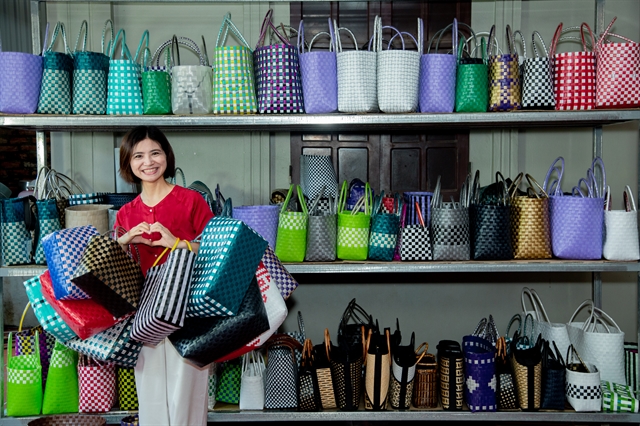
FULLY STOCKED: Share Happy Hanoi founder Nguyễn Thị Thanh Hương in her workshop in Vạn Phúc Village in Hà Nội’s Thanh Trì District. — Photos courtesy of Share Happy Hanoi
Born and bred in Vạn Phúc Village in Hà Nội’s outskirts Thanh Trì District -- a traditional craft village once famous for bamboo weaving -- Nguyễn Thị Thanh Hương was taught basic weaving skills when she was just four years old.
When weaving was the village’s major business, she spent all of her spare time with her family making bamboo products, just like her neighbours. The young girl never imagined that one day it would be her who brought a “new concept” to the village’s traditional products.
Leaving home to pursue her studies at the Teaching College and then the Capital University of Economics and Business in Beijing, Hương was no longer involved with the craft until a chance encounter with a Japanese entrepreneur a year ago.
“It was when I was working for Shonan, an investment consultancy for Japanese entrepreneurs,” she recalled. “A client was disappointed to hear that her order of 100 woven plastic tote bags -- a favoured item among many Japanese women -- had been rejected by a Vietnamese workshop.”
Though aware that sometimes business deals do fall through, she felt sorry for the client and agreed to take the order herself.
“I still can’t explain how I could have been so hasty in taking on that order. Maybe I was over-confident about my weaving skills, but I had acquired them during the course of my lifetime. Anyway, I felt like I could make a childhood dream come true.”
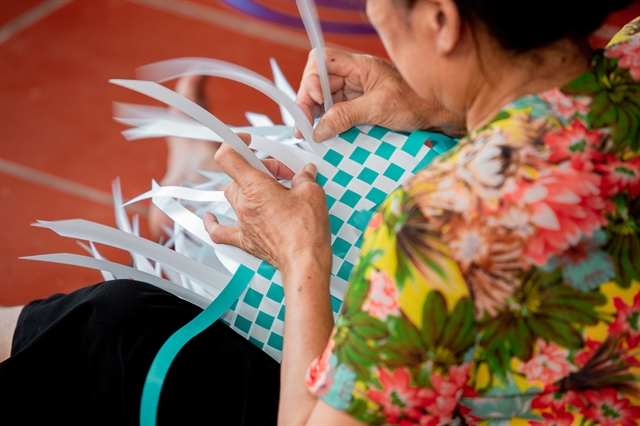
DEFT OF HAND: A local weaver works on a wicker bag at the Share Happy Hanoi workshop.
To fulfil the contract and meet the client’s quality requirements, the ambitious young woman had to search the internet for information on exactly how to create a plastic wicker bag.
“The weaving techniques for traditional bamboo and plastic rattan bags are basically the same,” she said. “But as the plastic rattan bags were new to me, I wanted to dig a little deeper into how they are made.”
While bouncing around the internet, she found a wicker weaving class in the south-central province of Ninh Thuận. She signed up without hesitation, and that single move changed her life completely.
On the first day, she was a little unsettled by the fact that her classmates were all poor local people from the Raglai ethnic minority. “Many were barefoot,” she recalled.
At that moment, a thought flashed through her mind. She wanted to do something to revive the fading craft of her home village in Thanh Trì.
“I was thinking how to elevate what was quite a simple product into one that could sell at a higher price,” she explained. “Once weavers can earn a higher income, they will stay with the craft.”
Back in Hà Nội after the class wrapped up, Hương fulfilled her first-ever contract for wicker tote bags together with a group of weavers in the village.
Community engagement
With positive feedback from that first client, Hương received other orders from other customers. As the workload rose, she had to recruit more and more weavers. And she found that working with the disadvantaged gave her special motivation.
“Being able to offer them jobs encouraged me to get the business off the ground,” she remembered. “Beyond just an income, I was giving them hope and confidence.”
Feeling inspired, the young businesswoman decided to name her wicker bags “Share Happy Hanoi”.
“Our aim was to make our customers happy with nicely designed bags meticulously crafted by disadvantaged people and weaving artisans,” she added.
Alongside the disadvantaged weavers, Share Happy Hanoi has also co-operated with several other groups of disadvantaged people to knit shoulder straps or sew the lining.
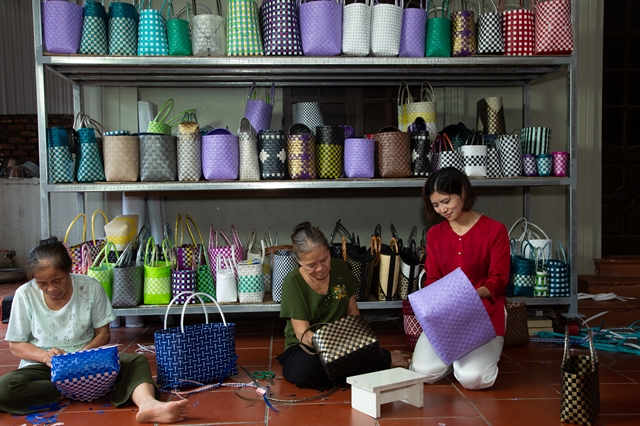
SHOWING THE WAY: Hương (right) at the workshop with local weavers.
The founder of Share Happy Hanoi said that when her business develops further, she will continue to co-operate with the Disabled People Associations of all districts in Hà Nội to open vocational courses and support them to earn a living.
Alongside focusing on creating jobs for the disadvantaged, Share Happy Hanoi has also focused on using recycled materials.
“As our clients are international, they also have requirements on environmentally-friendly materials, so we use only international-standard recycled plastic rattan for our products,” she explained.
The local brand also pays attention to promoting materials from ethnic minorities.
“To diversify our product designs, we use brocade woven by Thái ethnic people and indigo cloth from the Mông for the bag lining,” Hương said.
The enthusiastic and determined businesswoman is now learning about the specific decorative patterns of various ethnic groups, to adapt into her plastic rattan bags.
Like a toddler taking her first steps, there is much that Hương needs to learn to keep her dream business going. But she is fortunate to have a congenial companion, the overseas Vietnamese industrial designer and consultant Noen Nguyễn-Bankson, who she met by chance in HCM City when she was studying the market.
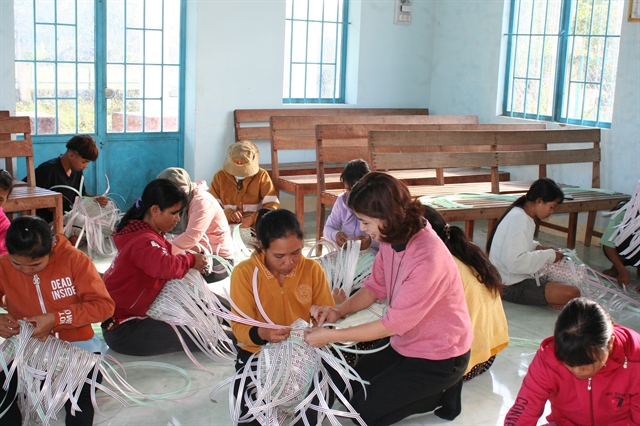
FROM STUDENT TO TEACHER: Hương holds a class on weaving wicker bags for ethnic minority people in Ninh Thuận Province.
“The more we talk, the more I can see her passion for reviving the craft of her home village and at the same time helping the disabled,” Nguyễn-Bankson said.
“I was surprised by her community engagement. We share a lot of common values, so I am pleased to be supporting her, from designing, logos, and websites to product consultation.”
Hương again headed back to Ninh Thuận last month; this time not to attend a weaving class but to teach one.
“Like the class I joined more than a year ago, this one also gathered together ethnic Raglai in need,” she said. “Many are earning a living by weaving rattan back baskets, for which they have to spend two days and two nights up in the mountains finding the materials.”
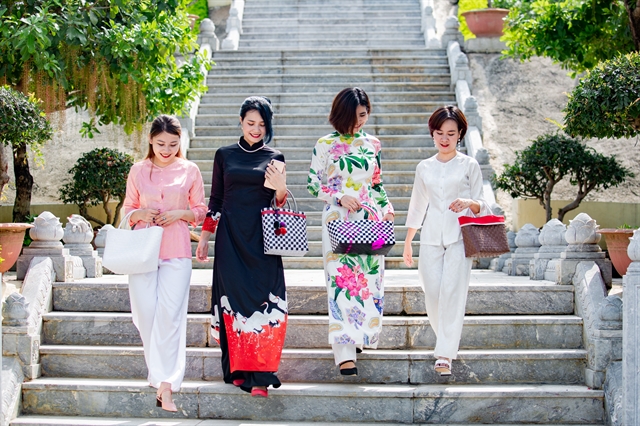
STYLE ON SHOW: Models with some of the bags from Share Happy Hanoi.
“They told me that if they could earn money from weaving wicker bags, they would no longer need to go into jungle, which is hard work. The moment I heard that, I promised myself I would help them become skilled weavers and create jobs for them.”
The founder of Share Happy Hanoi also nurtures plans to open similar classes for the Thái in the eco-tourism site of Mai Châu District in Hòa Bình Province, “which is also an ideal venue for DIY workshops for tourists,” she said. — VNS
OVietnam